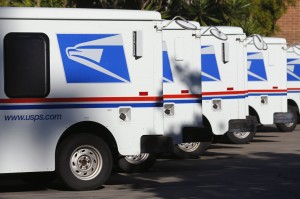If you’ve ever used the U.S. mail to ship anything remotely related to weed, you should take note: The Postal Service is apparently paying close attention to your letters and packages. Very close.
 The New York Times reported in late October that the Postal Service approved almost 50,000 requests to track mail for law enforcement in 2013. The disclosure was part of an internal audit at the USPS.
The New York Times reported in late October that the Postal Service approved almost 50,000 requests to track mail for law enforcement in 2013. The disclosure was part of an internal audit at the USPS.
The scope of the mail surveillance is much bigger than previously disclosed. Postal employees have worked closely with police on thousands of cases, often without warrants.
Under the Fourth Amendment, a warrant is required before law enforcement may open first class mail – letters, in other words. But cops and federal agents don’t need warrants to open packages or to track the external information on any piece of mail: sender, recipient, address, etc.
Substantial invasion of privacy
That information can be used to build criminal charges and track alleged accomplices. It can also lead to egregious violations of personal privacy.
The audit was critical of the Postal Service, saying the quasi-governmental agency fails to enforce adequate safeguards and manages investigations ineffectively.
“Insufficient controls could hinder the Postal Inspection Service’s ability to conduct effective investigations, lead to public concerns over privacy of mail and harm the Postal Service’s brand,” the audit said.
The program is called “mail covers,” and it’s been in existence for about a century. But it has increasingly become a means for the government to spy on civilians.
USPS cooperates with law enforcement
 Under the program, cops ask the Postal Service for cooperation in investigating people who use the mail. Postal workers record external information before mail reaches its destination, and they pass the information to law enforcement.
Under the program, cops ask the Postal Service for cooperation in investigating people who use the mail. Postal workers record external information before mail reaches its destination, and they pass the information to law enforcement.
As with every program of its kind, mail covers has been a source of political abuse. A prosecutor and sheriff in Arizona used the program to collect information against a political opponent. There have almost certainly been other similar cases.
The Postal Service also has a system called Mail Imaging that photographs the outside of every letter and package mailed in the United States. It’s designed mostly for sorting purposes, but it’s also used frequently as a surveillance tool.
This may not be a big threat to most stoners. If you live in a state where weed is legal, you don’t need to worry about how your pot gets to you. But a surprising proportion of the black market depends on the Postal Service, and for some people, cannabis is so scarce the mail is the only way to get it.
More importantly, the mail is supposed to be private. As in almost every realm of life, the federal government has decided it needs to know every detail about every piece of mail sent by anyone, anywhere, at any time. And that’s a sad development.






